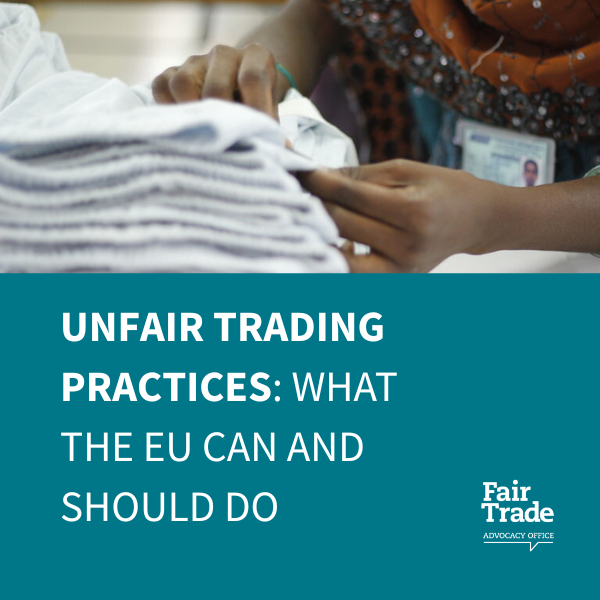Unfair Trading Practices in the textile sector: What the EU can and should do

On the 23rd of January, the International Trade (INTA) committee of the European Parliament hosted a hearing on Tackling Unfair Trading Practices in the Garment and Textile Sector.
Jorge Conesa, Managing Director at the Fair Trade Advocacy Office, was invited to speak in the panel representing civil society, together with David Hachfeld from Clean Clothes Campaign. Other speakers included Marsha Dickson from the Better Buying Institute, and Paul Kadjo, fashion designer and owner of an upcycling label. The hearing was chaired by MEP Bernd Lange, and experts from the European Commission were also present.
The hearing looked into the trade dimension of the Commission’s strategy for sustainable and circular textiles, in order to put forward policy and legislative solutions to the power imbalance between buyers and suppliers in global textile supply chains. This power asymmetry allows brands to impose very unfavourable terms of trade – such as late payment, retrospective discounts and cancellations of even partially produced orders – to their suppliers, with very harmful consequences on workers including severe human rights violations like forced and/or unpaid overtime, and increased risk of violence and harassment.
The EU Textile strategy is mainly focused on the environmental impact of textile production and consumption, but falls short on the social impact, and does not address the issue of UTPs.
Recent research by Aberdeen University shows that major fashion brands are paying Bangladeshi suppliers below the cost of production, with nearly one in five factories struggling to pay their workers the Bangladeshi minimum wage. But this is not only a third countries’ problem. “We are finalizing research that demonstrates that the same dynamics affect also garment producers in the EU, for example in Poland, Italy, or Romania” comments Jorge Conesa.
It was stressed that the sector is dominated by a climate of fear where, even in case of breach of contract, suppliers usually don’t complain for fear of losing their clients. “Shall we put all our efforts to call on a certain company to change the way they behave? Arguably, even larger companies are negatively affected by this situation” explained Conesa. “To stop Unfair Trading Practices, we need common rules at EU level, which must include all transnational business operations”, and inspiration can be taken from the 2019 Directive on agri-food UTPs.
Finally, the FTAO called on the INTA committee to further analyse the issue of UTPs from an international trade perspective by issuing an own-initiative report focused on how to ensure that global textile supply chains are fair and sustainable. “All trade should be fair, and a UTP Directive for textile will definitely contribute to that” concluded Jorge Conesa.
Further reading:
Briefing note: Regulating Unfair Purchasing Practices in the Garment Sector
###
Press contact: Marta Garda, garda@fairtrade-advocacy.org